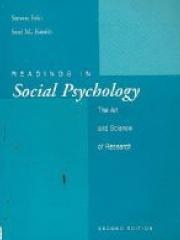
具体描述
yes over the First 10INTRODUCTIONThe Purpose of This Book0ne of the most rewarding aspects of teaching social psychology is that most students are interested in socialpsychological issues. Most of us--students as well as instructors--are interested in explaining the causes of others'behaviors, in predicting how people will react in various situations, and in understanding the attraction or hostilityI~tween people. But this interest can also present an important challenge to instructors. When people learn socialpsychological theories or findings that are at odds with their own intuition or personal observations, they may be tooquick to dismiss these theories or findings as wrong or unrepresentative. Then when they learn other theories orfindings that are consistent with their own intuition or personal observations, they may disparage the first theoriesand findings as mere common sense. The difference between the discipline of social psychology and people's intuitions and observations is empiricalresearch. Intuition and common sense can be frustratingly accommodating. One can, for example, cite, "Absencemakes the heart grow fonder," to explain the continued success of a romantic relationship after the couple has beenforced to spend some time apart from each other, and yet also cite, "Out of sight, out of mind," to explain the failure0fa different couple to endure a similar amount of time apart. Social psychology, in contrast, cannot have it so easy.Social psychological theories must be more rigorous, and they must be supported by the results of systematic,methodically sound research. To fully understand and appreciate social psychology, therefore, one must understandand appreciate the research on which the field of social psychology has been, and will continue to be, based. Yourtcxtb00k, the Fifth Edition of Social Psychology by Sharon Brehm, Saul Kassin, and Steven Fein explains much ofthis research clearly, concretely, and compellingly. The authors have made it a point to make this research comealive to students, to give students enough information so that they can imagine what it would be like to be a subjectin many of these studies. This book of readings was designed to take this emphasis a step further by presenting a diverse sample ofimportant, unabridged, original research articles. Whereas a textbook and class lectures can offer summaries of aamber of studies, only a sample of representative studies can give valuable insight into the process as well as the c0ntent of social psychology. The goal is to encourage students not only to learn the important theories and principles of the field, but also to think critically about them--to see where they came from, how they have been supported, why they have been supported, and what their potential flaws are. This kind of critical thinking not only makes the material more interesting and compelling but also leads to a deeper understanding of the material. Another goal of this book of readings is to illustrate the creativity involved in designing studies to test one's hypotheses. In this process, social psychologists often are challenged to combine elements of theater and science. Their experiments must be controlled and precise; procedures should be identical across conditions, with the exception of the manipulated independent variable(s); and potential alternative explanations should be anticipated ~ad ruled out. Within these constraints, however, researchers often need to create an artificial but very real world for their subjects. They need to anticipate the thoughts, feelings, and reactions of the people who participate in their studies, and they must create situations that are realistic and meaningful. "Doing" social psychology, therefore, often involves acting like a playwright; in conducting research, the social psychologist often must create characters, dialogue, and interactions among characters, must place these characters into various situations, and must create a ~tting, all with the intention of drawing the participants into this fabricated reality so that their reactions and resp0nses are real and spontaneous. Not all social psychological experiments require this level of creativity. Some studies are, by necessity, simple, whereas others are quite elaborate. Some involve a great deal of deception; others involve no deception. Some elicit slr0ng emotional reaction; others are quite mundane. Some are conducted in a laboratory; others are conducted in the field. But whatever the level of complexity, the process that begins with a set of hypotheses and proceeds
作者简介
目录信息
读后感
评分
评分
评分
评分
用户评价
在案例的选取和深度挖掘上,这本书展现出了令人印象深刻的广度和前瞻性。它不仅仅满足于引用经典的、大家耳熟能详的那些社会心理学实验,更引入了大量近年来在数字时代背景下产生的全新现象作为研究对象。比如,它对网络群体极化现象的分析,就非常细致入微,不仅剖析了背后的心理机制,还结合了最新的媒体传播学观察。我发现,作者在介绍每一个案例时,都会花费不少笔墨去探讨这个案例在不同文化背景下的适应性或差异性,这使得整本书的视野非常开阔,避免了将西方主流研究成果进行“普适化”的倾向。每一次阅读这样的案例时,我都会被那种跨学科的思维方式所震撼,它让我意识到,社会心理学绝不是孤立的一门学问,而是理解现代社会运作的必备工具。
评分这部书的封面设计着实抓人眼球,那种略带粗砺感的纸张纹理,搭配上封面中央那张富有深意的黑白照片,瞬间就将我拉入了一种探究人性深处的氛围。我记得当时在书店里,光是翻阅前几页的排版和字体选择,就觉得编辑团队下了不少功夫。特别是章节标题的处理,不像有些教科书那样死板,它用了一种既专业又不失活泼的字体组合,让人感觉接下来的内容不会是枯燥的理论堆砌。书的装帧质量也是没得说,即便是被我频繁地携带和翻阅,书脊依然保持得很好,这对于经常需要做笔记的读者来说,简直是福音。我尤其欣赏它在引入新概念时所采用的视觉引导,比如那些精心绘制的概念图和流程图,它们不是简单的信息罗列,更像是对复杂社会现象的一种艺术化解读。这种对细节的关注,从纸张的触感到视觉呈现,都透露出一种对知识载体的尊重,让阅读过程本身成了一种享受,而不是负担。
评分这本书的逻辑架构设计得极为精妙,完全不像那种平铺直叙的学术著作。它更像是一场精心编排的辩论赛,每一章都像是一个独立的论点,层层递进,引导读者去质疑既有的社会认知。我最喜欢它的章节过渡方式,它不会生硬地切断前后的联系,而是通过设置一些引人深思的“思考题”或者“现实案例对比”,自然而然地将读者的注意力引向下一个核心议题。这种叙事手法,让我在阅读时,总有一种“急切想知道接下来会发生什么”的冲动。特别是当它处理一些具有争议性的社会心理学流派观点时,作者的处理方式非常公正和平衡,没有强行灌输某一种立场,而是把证据链清晰地摆在面前,留给读者自己去权衡判断。这种对批判性思维的持续激发,是我认为它超越一般入门读物的地方。
评分让我印象特别深刻的是这本书对自我反思的鼓励。它在每一章的结尾,都会设置一个“反思你的世界”的小栏目,这个环节的处理非常巧妙,它不是让你简单地回顾学到的知识点,而是引导你将书中的理论工具,应用到你最近一次与人发生争执的经历、或者你对某个社会热点事件的第一反应中去。这种“学以致用”的训练,远比死记硬背概念有效得多。我通过这些练习,开始有意识地去审视自己决策背后的隐性偏见,甚至在与朋友讨论问题时,也能更清晰地识别出对方可能陷入的认知陷阱。这本书真正做到的,是提供了一套观察世界的全新“滤镜”,让原本混沌的社会互动变得可以被分析和理解,这对于一个渴望更清晰认识周围世界的读者来说,价值无法估量。
评分这本书的语言风格简直是一股清流,它成功地避免了学术写作中常见的晦涩难懂和过度专业化的术语堆砌。作者似乎非常懂得如何与一个求知欲旺盛的普通读者对话,用词精准却又不失烟火气。我记得读到关于“社会认同理论”的那一节时,作者引用了几个极其贴近日常生活的群体行为例子,那种代入感极强,让我忍不住笑出声来,但笑过之后,那种心理学原理却已经深深地刻在了脑子里。它不是那种冷冰冰的知识传递,更像是一位经验丰富的导师在耳边娓娓道来,时不时地用一句充满智慧的俏皮话来点醒你。这种既保持了严谨性,又不失亲和力的文风,极大地降低了社会心理学这门学科给人的距离感,让复杂的理论变得触手可及。
评分 评分 评分 评分 评分相关图书
本站所有内容均为互联网搜索引擎提供的公开搜索信息,本站不存储任何数据与内容,任何内容与数据均与本站无关,如有需要请联系相关搜索引擎包括但不限于百度,google,bing,sogou 等
© 2026 qciss.net All Rights Reserved. 小哈图书下载中心 版权所有





















